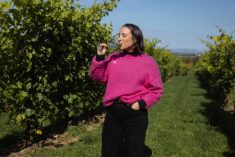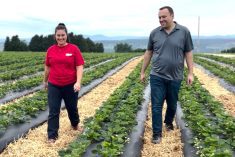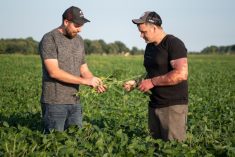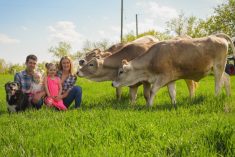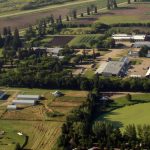Canada’s Outstanding Young Farmers will experience the hospitality of Quebec in late November as regional nominees and alumni gather in Laval for the national awards competition.
Along with the seven OYF regional nominee farm families, about 200 alumni and guests from the program will attend the 43rd national awards event that runs Nov. 23-26.
Nominees for the awards competition include Brad and Travis Hopcott from Pitt Meadows, B.C., who are part of a diversified family farm producing beef as well as cranberries; Greg and Sarah Stamp of Enchant, Alta., part of a family-run pedigreed seed farm; Jake and Sarah Leguee, a brother and sister from Weyburn, Sask., who are part of the management team on the family grain and oilseed farm; Harley and Brooklyn Siemans of Rosenort, Man., who have built a successful 95,000-bird free-run laying hen operation; Stewart Skinner and Jessica Kelly, who own and operate a 25,000-head hog and cash crop operation at Listowel, Ont.; Marijke Oudshoon and Willem van de Wetering, potato producers from Morell, P.E.I.; and from the hosting province, Remi Taillon and Sophie Brodeur of Saint Dominque, Que., who own and operate a grain-fed veal and cash crop venture.
Read Also
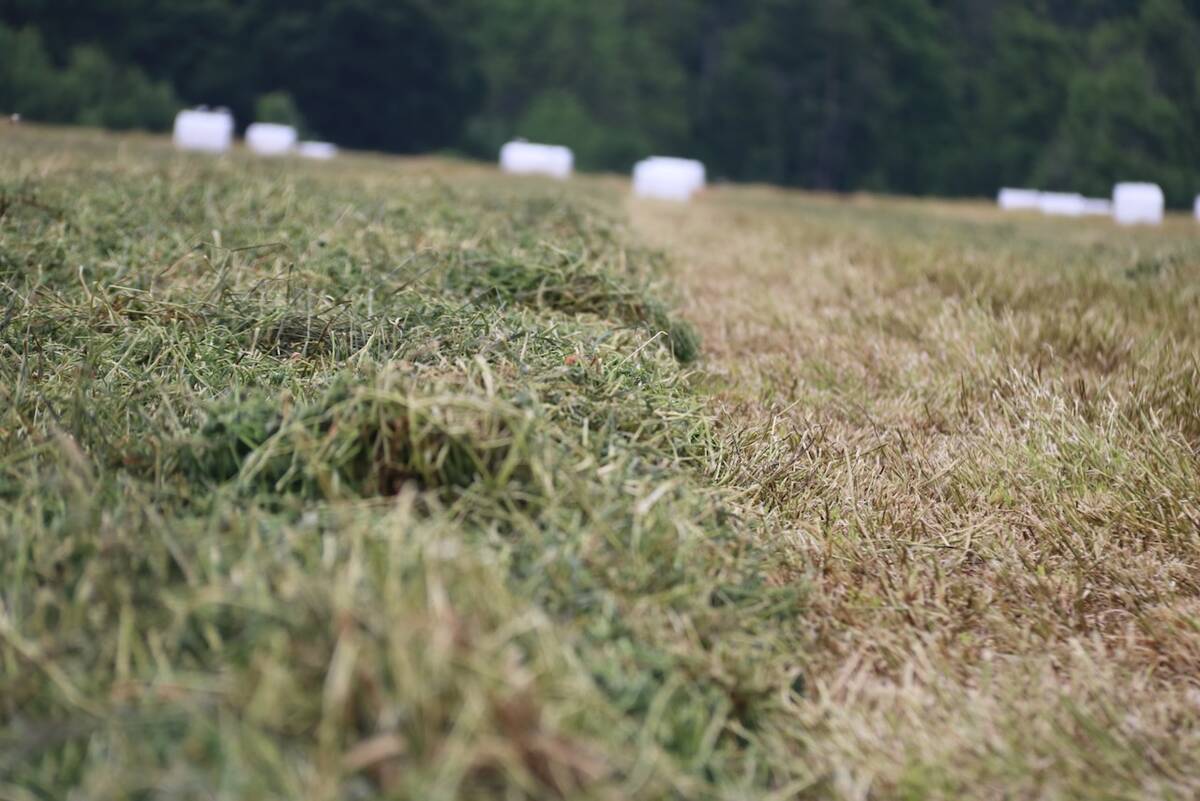
New high-performance forage training program to launch in 2026
A new Canadian Forage and Grasslands Asssociation high-performance forage program will be a resource for farmers, agronomists and others in the forage sector.
Willem van de Wetering and Marijke Oudshoon
Atlantic Canada

Willem van de Wetering and Marijke Oudshoon are not afraid to try new things. Over the past six years, they have learned how to grow potatoes on their Prince Edward Island farm, diversified their marketing options, increased on-farm potato storage, and trialled different farming practices such as cover cropping.
The two grew up on their respective dairy farms in Holland before immigrating with their families to Canada about 20 years ago. They say as part of the steep learning curve in the potato business, they are working to develop a profitable, more efficient and environmentally sustainable farming operation.
Their enthusiasm and passion for agriculture, combined with sound business practices, earned them recognition earlier this year as Atlantic Canada’s Outstanding Young Farmers regional winners.
Oudshoon’s family moved to Ontario in 1999 and Van De Wetering’s family moved in 2007. In Ontario, both families were farming poultry and cash crops while Oudshoon’s family also raised pigs and veal calves.
The two met in Ontario and shared a passion for the agriculture industry. Oudshoon went to Ridgetown College and Olds College and received a degree in Agriculture Business. Van De Wetering worked at a John Deere dealership in Ontario and received his Red Seal qualification as a mechanic.
While they were familiar with the dairy industry, “we were looking for any opportunity in agriculture where we could make a start and have a reasonable cash flow,” says Van De Wetering. All options were considered, but potato production in the Maritimes caught their attention.
With zero potato production knowledge, they moved to Prince Edward Island in 2017. Working with the previous landowner, they were able to take over an existing potato farm. Today their Spud Isle Farms near Morell, on the northeastern side of the Island about 45 kilometres from Charlottetown, includes about 1,400 acres of both deeded and rented land.
They follow a three-year rotation, with about one-third of the farm in potatoes and the other two-thirds seeded to cereal crops, such as wheat, barley or oats, usually under-seeded to forages such as red clover and timothy.
In the first two years, they followed the previous owner’s production practices and then introduced a few changes. Initially most of their potato crop was under production contract with Cavendish Farms and all product was shipped to company storage facilities.
“In the last few years, we have been developing our own on-farm storage for a few different reasons,” says Van De Wetering. “There was one older warehouse on the farm we renovated for potato storage in 2019. That made it possible to look at some other marketing opportunities.”
Rather than selling all production under a contract to a processor, a portion of their crop is now sold to a wholesaler that supplies the fresh potato market. Spud Isle supplies bulk potatoes to the wholesaler, who then bags them for the retail market.
“In 2019, about 50 acres of our production was sold into this fresh market and now we have about 135 acres going into that market,” he says.
Also, in 2019, they bought and renovated another building with room for about three million pounds of storage. This year, they’ve added another building with capacity for a further five million pounds of potatoes.
“It gives us more marketing options and it also improves harvest efficiency,” says Van De Wetering.
Remi Taillon and Sophie Brodeur
Quebec

Quebec farmers Remi Taillon and Sophie Brodeur have worked over the past 15 years to develop an efficient and profitable grain-fed veal operation that complements their nearly 500 acres of annual cash cropping produced under sustainable production practices.
Due to unforeseen circumstances, their business plan is two to three years ahead of schedule, but overall it has worked out well. Their work, commitment to family values and sound business practices earned Taillon and Brodeur recognition earlier this year as Quebec’s Outstanding Young Farmers for 2023.
They farm at Saint-Dominque in southwestern Quebec, about 80 km east of Montreal.
Brodeur and Taillon have been together for about 20 years. Brodeur, who was born and raised on the family farm, had dreamed of becoming a farmer since she was very young. Growing up on a milk-fed calf and field crop farm, she liked taking care of animals.
Brodeur completed a college diploma in animal production and obtained a certificate in environmental science before working at the Quebec Pork Development Centre as a technical adviser.
Taillon was not raised on a farm. He worked as an engineer in a firm specializing in manure slurry treatment following his bachelor’s degree in biotechnology engineering. Not entirely satisfied with his life as an engineer, he dreamed of entrepreneurship.
The opportunity to realize their dreams presented itself in 2009, when Brodeur’s father offered them a chance to start farming.
“This wasn’t the farm I grew up on but was a farm that my father owned that was just next door,” says Brodeur. “It was a chance for us to start our own veal and cropping operation.”
That was the beginning of Ferme Réso, one of about 140 grain-fed veal operations in the province.
Over the next few years, they improved facilities for raising and feeding calves and were able to improve production efficiency. They switched from producing milk-fed calves to producing grain-fed and finished animals.
And while initially they produced calves under contract for a processor, they became independent producers. That gave them more control over production practices and marketing options. After two years, they were able to buy a 50 per cent share in the farm, with plans to complete the purchase in 2021.
“One of the most difficult times was in 2017 when my father was diagnosed with an aggressive and advanced form of cancer,” says Brodeur.
“We had to come to terms with the reality of the disease. It was important to spend time together, as well as being a caregiver. At the same time, we also had the farm to run, and we were raising our own family. It was a very difficult and busy time.”
Although it was ahead of schedule, the couple made the decision to buy out the rest of their farm in December 2017, a few months before her father died in mid-2018.
“Fortunately, we were in a position to do it and I believe it gave my father some comfort knowing that we were well established and running a profitable farm,” says Brodeur.
Today she and Taillon, along with four children, are cropping about 476 acres, 230 of which are owned. Ferme Réso produces 1,200 grain-fed calves annually that are fed grain corn grown entirely on the farm.
Along with corn, the crop rotation includes soybeans, wheat and oats. Brodeur and Taillon value good agronomic and environmental practices that include growing green manure, intercropping, strategic use of pesticides, planting windbreaks and maintaining buffer zones of riparian habitat along waterways on the farm.
“We seed radish and mustard with oats, which serves as green manure,” says Taillon. “And for intercropping, we seed rye grass between the corn rows, which provides good ground cover after the corn has been harvested.”
All manure from the veal calf operation goes back onto the land, and they also receive manure from nearby farming operations.
“These are all practices that help us reduce reliance on synthetic fertilizer as much as possible,” he says.
“Today we have accomplished more than we originally had in mind for our farm business,” says Taillon. “Our vision remains the same: to be efficient and autonomous, be in control of our own farming operation in everything we do. The purchase of Sophie’s parents’ family farm one day remains a goal that we will achieve when the time is right. The expansion will allow us to establish our succession in the family farm, which is extremely important to us.”
Jake and Sarah Leguee
Saskatchewan
Defining on-farm roles for the principle owners, strategic planning, applying new technology and peer review of their farming operation — these are among the tools the Leguee family (family photo at top) use to help manage a profitable southern Saskatchewan grain and oilseed farm.
The tools don’t change the weather, says Jake Leguee, who owns and operates the third-generation family farm along with his sister Sarah and brother in-law Erik. But, overall, it does help them be prepared and have the flexibility to manage their diversified crop production under variable growing conditions.
They believe in the immediate planning of what work needs to be accomplished today and this week on their 15,000 acres of cropland near Weyburn. They also rely on expertise that helps them see the longer term, set the course for the next year or two and make plans for the fourth generation that may be interested in farming.
Their family governance structure, use of agronomic technology and the financial success of their operation earned Leguee Farms recognition as Saskatchewan’s Outstanding Young Farmers for 2023.
Jake, Sarah and Erik transitioned to take the helm of Leguee Farms over the past dozen years. Leguee Farms was established in 1956, when grandparents Don and Elsie Leguee bought the home section at Weyburn. Jake and Sarah’s parents, Russ and Sharon, took over the farm in the late 1970s.
In the early 2010s, management transitioned to generation three, as Sarah and Jake became partners. In 2017, Erik Nikolejsin, husband to sister Amber Leguee, joined the farm. Today, Sarah, Jake and Erik manage the farm as a team.
“My dad, Russ, is still actively involved and here every day to help as needed, but leaves the overall management to us,” says Jake.
Over the extensive land base — about 50 per cent owned and the remainder rented — they produce canola, spring wheat, durum, lentils, flax and peas. Everyone brings their knowledge and skill set to the table.
Sarah has diplomas in agriculture production and ag business, Jake has a degree majoring in agronomy with a minor in ag business and Erik is a journeyman mechanic.
Three major features of Leguee Farms involve their family governance. Each owner has specific responsibilities; advanced agronomy that includes use of technology and analyzing data to guide production decisions; good communication, planning and goal setting among the farm partners; and use of facilitated strategic planning with the consulting services of Backswath Management.
Leguee Farms also meets with a peer group of nine other farmers three times a year to learn what other farmers are doing and get feedback on their own management. Once a year they also meet with an advisory board of experts in finance, management and marketing.
Sarah is vice-president of grain logistics, looking after grain storage and inventory, grain sampling and quality, communication with grain companies and grain hauling.
Erik is vice-president of operations, looking after the day-to-day management of employees, managing the shop and work scheduling.
Jake is president and managing partner involved with strategic and long-term planning, finances, marketing and agronomics, which involves both time in front of the office computer and in the field scouting.
“As partners, we all have defined responsibilities,” says Jake. “But at the same time, we are all involved in the general operation of the farm. Whatever the current season is, we are all out there in the field.”
On the agronomy side, Jake says they do their best to intensively manage crop production over variable and sometimes difficult soil conditions. They were among the first farms about 10 years ago to install a network of six weather stations with soil moisture probes across their cropped acres.
That technology has provided a considerable amount of data that can be analyzed and used to develop spreadsheets and algorithms to help with management decisions.
Jake says planning, communication and goal setting among partners, with input from outside expertise, is a vital component of the farm’s success.
“We have regular meetings to decide what we are going to do this week or over the next month, but then we also have strategic planning sessions where we also discuss goals and objectives over the next three to five years.”
Harley and Brooklyn Siemans
Manitoba

If visitors drop in at Siemans Farms at Rosenort, Man., and Harley Siemans doesn’t come to the door, he could be in one of the poultry barns training birds how to fly.
As true as that might be, it is a small but important part of the highly technical business of producing eggs in a free-run poultry system.
On a daily basis, Siemans monitors the computers in the farm office as he fine-tunes feeding programs and environmental conditions for about 95,000 birds at various stages of egg production in five different barns at three separate farm locations.
He and his wife, Brooklyn, are the fourth generation on the family farm about 50 km south of Winnipeg. They are passionate about egg production and about farming in general.
“I believe it was when we converted our production system from the conventional battery cages to the aviary free-run system that it really ignited my passion and drive for the industry,” says Siemans, who was only about 22 at the time.
“Converting the operation to free run just provided us with many more opportunities. I also have to give credit to my parents, Kurt and Tami, for their support and trust in me during the farm succession process.”
Their commitment to cage-free egg production and sound financial management, involvement with industry associations and devotion to family and community that earned Harley and Brooklyn recognition earlier this year as Manitoba’s Outstanding Young Farmers for 2023.
The Siemans family has been involved with the poultry business for nearly 70 years. Harley’s grandparents had a layer hen operation and his parents also ran a 17,000-bird conventional layer barn.
In 2016, Siemans graduated from the University of Manitoba diploma program and was interested in returning to the farm, so plans were made to update and expand the business.
“Dad and I discussed the options of bringing me into the farm business” says Siemans. “I also travelled across Canada looking at a number of different poultry operations. We decided that a free-run aviary system was the way to go.”
That led to a major expansion. In 2017-19, the barn was replaced with three state-of-the-art, free-run aviary barns that house 25,000 layers and 25,000 pullets. A couple of years later, they bought into Manova (2012) Ltd., another poultry farm, with 70,000 layers in barns at Blumenort and Niverville. Siemans was named president of the corporation.
Within three months of ownership of Manova, one of the smaller barns was converted to a 25,000 layer, free-run aviary system. The other barn, built in 2012 with an enriched-style layer system, holds about 50,000 birds.
“It is a fairly new building, but eventually we plan to convert it to a free-run system as well,” says Siemans. There is one manager at each farm site, and a total of eight employees running the layer operations.
The free-run aviary system is cage-free, with all birds loose on the floor of the barn. Above the birds are three tiers or balconies. They fly to the first tier for food, the second for nesting boxes and water and the top for more food.
In the pullet barn, where day-old chicks are raised to egg production age at 18 weeks, the birds need to develop bone strength as well as wing and leg muscles so they can fly to those upper tiers once they are moved to the layer barn. That’s where flight training comes in.
“When the chicks are about three weeks of age, we work with them daily in the pullet barn so they learn to fly to the upper tiers,” says Siemans. “It is a labour-intensive process, but very necessary.”
There is a lot of technology used throughout the production system to monitor and control nearly every aspect of the barn environment, feeders, watering system, egg collection and storage, manure handling and lighting.
There is also a great deal of data that Siemans uses to develop algorithms to guide operations. He has developed software that is marketed to other egg producers.
Greg and Sarah Stamp
Alberta

There was tough going in the early years when Greg and Sarah Stamp returned to the southern Alberta family farm, but perseverance and determination helped them and family members to build a successful seed business.
The early 2000s were perhaps a poor time in agriculture, says Stamp. Along with his brothers, Matthew and Nathan, and parents, Richard and Marian, the family owns and operates Stamp Seeds at Enchant, about 80 km north of Lethbridge.
“You didn’t see too many 40-year-olds getting involved in agriculture in those days,” says Stamp. “It wasn’t a particularly profitable time. Today I’m seeing more 25- and 35-year-olds involved in the industry, as they can see there are more opportunities.”
Perseverance, their production and management skills, and commitment to family and the community earned Greg and Sarah recognition earlier this year as Alberta’s Outstanding Young Farmers for 2023.
Along with being involved with the family farm, the couple are actively involved in the community and industry organizations, while also raising a family of six children.
At Stamp Seeds, they crop about 7,000 acres of deeded and rented land — 5,000 acres under irrigation and 2,000 acres of dryland. They produce pedigreed seed including wheat, barley, spelt, faba beans, peas, lentils, flax, hybrid rye, grass and hybrid seed canola.
Stamp Seeds retails and wholesales seed and contract grows and multiplies stock seed for 1,500 customers.
Stamp’s parents were the first generation, beginning with commercial crop production in 1979 and switching to pedigreed seed production in 1984. When Greg and Sarah decided to join the operation in the early 2000s, the farm was about 500 acres and had a limited customer base. It needed to expand to accommodate another family member.
“Those first eight years were tough. It was hard to get things moving in the right direction,” says Stamp. They had to grow the land base, but land was expensive. They had limited equity, so banks were reluctant to loan money. Crop prices were down, there were a few seasons of poor weather, cash flow was limited and machinery needed to be upgraded.
“There were a few times we said to ourselves ‘what are we doing here?’” says Stamp. “But at the same time, we decided we’ve come this far, we’ll just keep going. We just picked away at growing the business and eventually things started to come together.”
Those tough years also taught important lessons about being as efficient as possible and having discipline. New is nice but if you can’t afford it, make do with what you have.
Gradually they were able to buy more land and rented some as well.
“At one time we rented as much as 70 or 80 per cent of the land we farmed, but that helped us generate money so we could buy more land.”
From about 2010 onward, Stamp Seeds started an expansion phase. They were farming more acres, growing different types and more varieties of crops, and the customer base was increasing. By 2015, the farm needed more help and at about that time brothers Matthew and Nathan decided they were interested in joining the business.
As the farm grew and workload increased in production and seed retail, job responsibilities had to be shared.
“Trying to look after the farm as well as the seed business became too much for just one person, but at the same time, although it was necessary, it was a bit difficult to let go,” says Stamp.
The three brothers now have defined responsibilities. Greg is the seed sales manager, Nathan is the farm manager and Matthew is the business operations manager. They are all responsible for production of high-quality seed and they oversee 19 full-time and nine seasonal employees.
The farm managers have quarterly meetings with the chief financial officer to get updates on the financial position, and managers and staff meet monthly or every two weeks, depending on need, to discuss operations and set goals.
Stewart Skinner and Jessica Kelly
Ontario

In a competitive industry with volatile market conditions, Stewart Skinner and Jessica Kelly weren’t really interested in getting involved in commodity pork production. But as they looked at the options, producing pork for specialty meat markets presented an opportunity.
Over the past eight years, the farming couple at Listowel, about 160 km west of Toronto, have developed a network for niche market pork production. They supply certified humane and certified organic pork to wholesale markets largely for retail distribution in the United States.
It has been a learning process to improve production efficiency but the owners of Imani Farms Ltd. (Imani is a Swahili word for faith and belief) say there are opportunities ahead.
Their farm management skills, sound financial management and innovative approach to human resources management with their 15 employees earned Skinner and Kelly the recognition as Ontario’s Outstanding Young Farmers for 2023.
They grew up on separate hog farms in western Ontario and met at the Ontario Pork Congress. They obtained masters’ degrees from the University of Guelph and pursued agriculture-related careers before returning to Skinner’s family farm in 2015.
“We both had a keen interest in agriculture, but we really didn’t know what we wanted to do,” says Skinner.
His parents wanted to transition out of farming, so the young couple bought their 350-sow conventional production farm and were in a sort of holding pattern until they made decisions.
“As conventional pork producers, we knew we would be small, with no market power, no scale of operation and I really didn’t want to be in the sow barn every day,” Skinner says. But specialty or niche market pork production was a different story.
They connected with a packer who wanted a specialty product, certified humane pork, and that set the wheels in motion. They converted the home barn to a certified humane facility. That is an open production concept where animals are never in gestation stalls, have bedding materials and generally are free to do what comes naturally.
The farm also connected with other producers, mostly in the Eden Mennonite community, and contracted their facilities for different stages of the production process. Later, they added contract producers to also produce organic pork to supply other niche markets. Organic pork is raised under the same standards as humane pork, except that all feed is produced organically.
Today, Imani Farms owns and manages 1,500 sows reared in certified humane facilities, with another 350 reared under organic pork production practices. Imani Farms handles 40 per cent of the total production, and about 60 per cent is handled by contractors.
Most of their production is marketed to processors who supply retail markets in Wisconsin and California.
Travis and Brad Hopcott
British Columbia

Good management and quality products are obviously important, but add a good location and, as the Hopcott family of Pitt Meadows, B.C., have learned, it becomes a winning combination for a diversified farming operation.
Hopcott Farms started out as a dairy farm in 1932 before switching to a beef feedlot in 1957. Located just off Highway 7 (the Loughheed Highway), it has become a well-known and popular retail outlet across B.C.’s Lower Mainland. It supplies farm-raised beef and fresh, locally grown fruits and vegetables.
“I describe it as a boutique butcher shop,” says Travis Hopcott, who is part of the third-generation family farm. “We have the on-farm butcher shop as well as a fresh case meat counter, a wide selection of locally grown produce, an excellent deli department and a bistro as well. And with about 20,000 vehicles a day passing by our driveway, it has become a popular retail outlet for Lower Mainland consumers.”
Their overall management and financial success, profitable beef feedlot and expanding retail operation, along with diversification many years ago into cranberry production, earned Travis and his brother Brad recognition earlier this year as British Columbia’s Outstanding Young Farmers for 2023.
Hopcott Farms has a beef feedlot, which finishes about 1,000 head per year, and complements the on-farm retail outlet that has operated since 2006. The farm diversified into cranberry production in 1996, when giant cranberry processor Ocean Spray was looking for increased production. The Hopcotts signed up 72 acres, now divided into five cranberry bogs.
The farm is truly a family operation. Bob and Debbie, the second generation of Hopcotts, are actively involved, daughter Jenn is operations manager, son Travis looks after cranberry production, son Brad manages the beef feedlot and daughter-in-law Rachel is a wedding and events co-ordinator.
Across all operations, Hopcott Farms employs about 80 people.
The farm buys weaned fall calves and yearlings, commonly sourcing Red and Black Angus, Hereford and Charolais cross animals to be finished on a forage and grain-based ration. The farm retails about 70 per cent of production through the on-farm store, with the remainder sold wholesale to other meat retailers in the area.
The farm also markets hay and manure to local customers. It opened an abattoir in 2022.
“We are processing more beef animals, and it was costing us about $500,000 per year to use other slaughter facilities,” says Travis. “It just made sense to improve efficiency by having our own facility. It gives us more control over our meat products, and it also reduces risk by having the plant available to ensure the flow of beef.”
The original 6,000-square-foot retail outlet, built in 2006, had a major upgrade and expansion in 2015 to increase space to about 15,000 sq. feet. The expansion improved all aspects of the outlet, providing a larger fresh meat display counter, a proper deli department, more capacity in the bistro section and more display area for fresh produce and other products.
When Ocean Spray began looking nearly 30 years ago for increased cranberry production, Travis says his dad figured it was an opportunity the farm couldn’t pass up.
“It was an opportunity to diversify the farm with a stable source of revenue. It cost about $2.5 million to develop 72 acres of farmland into 15- to 18-acre cranberry bogs. And once the perennial crop is planted, it takes about four years for it to come into full production.”






